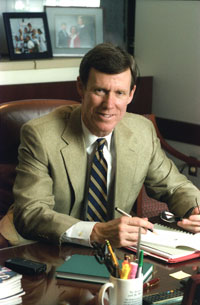
| Dean's Message | ||||||||||||||
|
Message from the Dean
During the past year the UW School of Medicine has further implemented the new UW School of Medicine college system. All UW medical students are assigned to one of five colleges named after natural wonders in Washington, Wyoming, Alaska, Montana, and Idaho; respectively, Rainier, Wind River, Denali, Big Sky, and Snake River. Each college faculty member mentors six students from each class for the duration of their medical school experience. The faculty mentor works with them at the bedside during the second year and meets with them regularly in other years. Devoted to their students, these talented teacher-clinicians teach clinical and professional skills in five core areas: physical exam and diagnosis; clinical reasoning and interpretation; communications; professionalism and ethics; and the use of informatics. This year, the college faculty members have been developing and refining specific benchmarks for use in teaching students and in measuring their progress each year. Students demonstrate mastery of these benchmarks by taking comprehensive examinations using standardized patients at the end of their second year and during their fourth year of medical school. I believe that the UW college system underscores the central importance of clinical skills in training physicians and helps students concentrate on patient-centered care. Our innovations are setting an example for medical educators nationally, and, I believe, link what is enduring in medical education with the changes needed to address the next era in medicine. UW Medicine faculty also implemented important changes in graduate medical education programs during the past year. Some of these changes were designed to comply with new national standards that limit residents work to 80 hours per week. Our faculty went beyond the implementation of the new national standards, however, to initiate a review of the entire graduate medical education curriculum and to enhance its educational focus. We expect these changes to result in even higher quality resident training and patient care. Alongside these developments in our educational programs, UW Medicine has expanded its scientific leadership role. We are proud of our faculty's many research accomplishments that will ultimately improve patient care. The creation of new research facilities will enhance the already highly respected scientific work at UW Medicine. Construction of state-of-the-art buildings and remodeling of existing spaces are under way at our main campus. Laboratory facilities for UW Medicine are also under construction at Seattle's South Lake Union research hub. Business leaders, political leaders, and scientists are encouraged by the possibilities of this neighborhood of science, where talented researchers will work together to discover treatments for serious or incurable diseases. I anticipate that the South Lake Union research hub will open new avenues in medical progress and boost the region's economy and employment outlook. Recognizing that public universities are key to the region's future, business leaders have become strong advocates for higher education and the search for scientific knowledge. The faculty, staff, students, and administration of UW Medicine are grateful for this support, as well as for the actions that donors, alumni, foundations, medical and scientific societies, policy makers, and elected officials have taken and will take on behalf of medical education and research. Through this public and private acknowledgment of UW Medicine's mission, a great institution is becoming even greater in preparing new health professionals, caring for patients, and performing studies to gain knowledge, protect health, and treat disease. Paul G. Ramsey, M.D. Vice President for Medical Affairs and Dean of the School of Medicine |
||||||||||||||
|
© 2003 - 2004 UW Medicine
Maintained by UW Health Sciences and Medical Affairs News and Community Relations Send questions and comments to drrpt@u.washington.edu |
||||||||||||||


